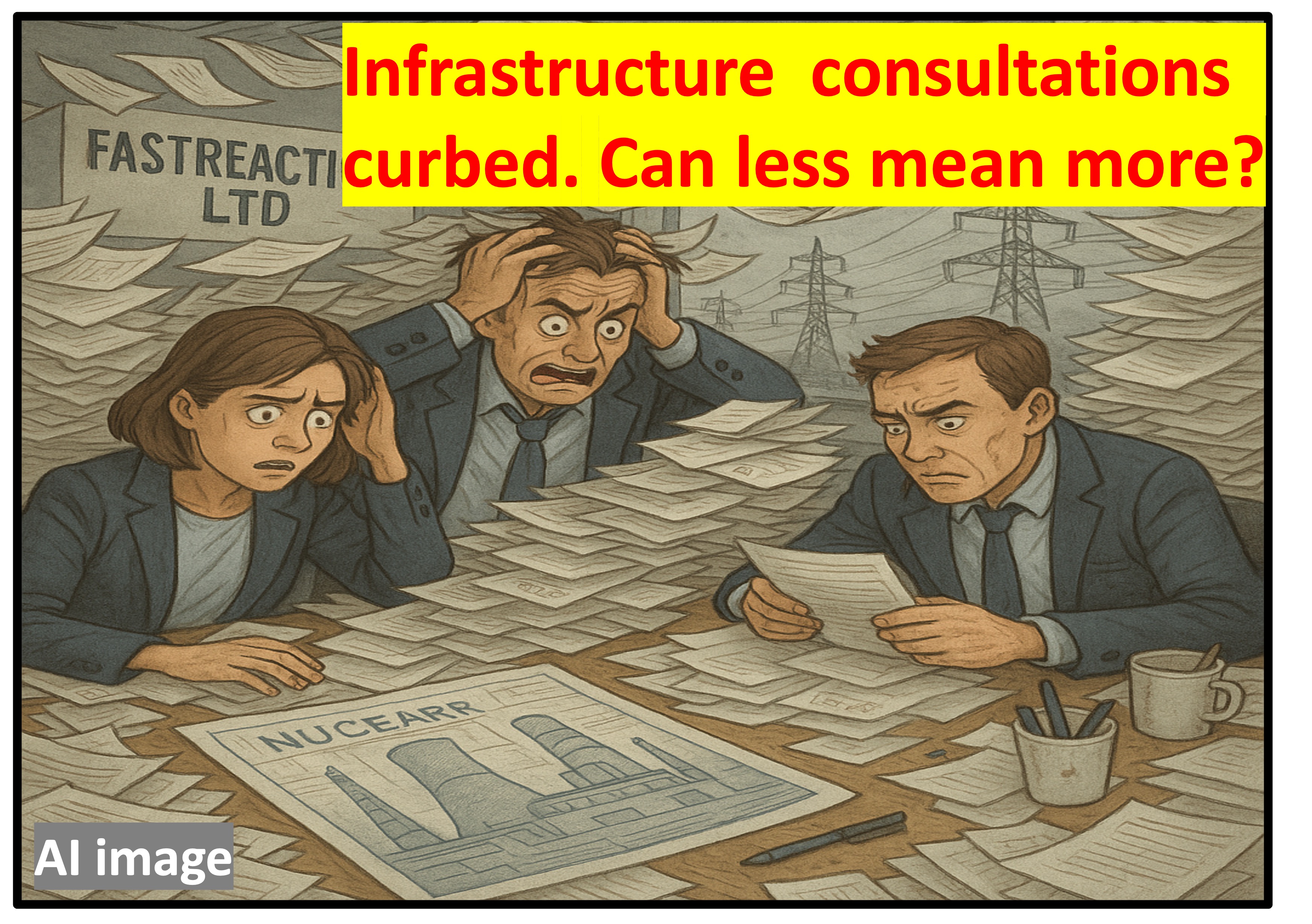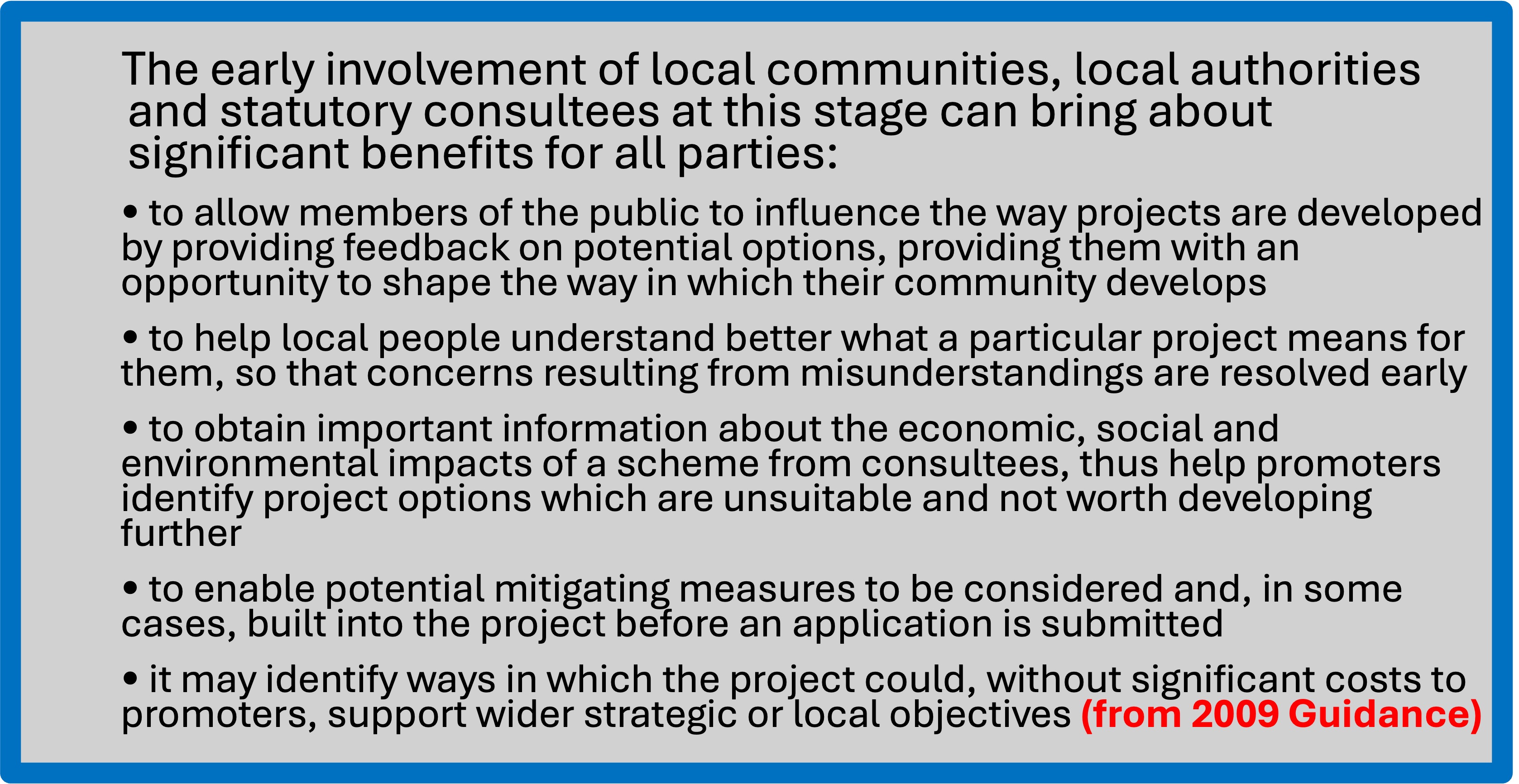This is Blog 99
There have been mixed reactions to the Government’s announcement that it intends to scrap the legal requirement for pre-application consultations on Nationally significant infrastructure projects.
The development industry, unsurprisingly, welcomed the move, as Ministers claimed that this may shorten the lead-time for major projects by a year or more. Given the Government’s preoccupation with economic growth, it is easy to see the attraction. Not everyone agrees.!

In a nutshell, this is the Government position:
• Current statutory requirements are burdensome, cause delays and confusion, and are prone to ineffective ‘gold-plating’.
• Removing the legal duty will not necessarily undermine the importance of early engagement with impacted communities, but will allow more flexibility.
• The Planning Inspectorate will still expect high-quality early, meaningful and constructive engagement and consultation to take place with those affected as part of that process.
In some ways, I share Ministers’ frustration with existing practice, I recently undertook a review of an extensive pre-application consultation for a controversial Development Consent application (DCO) expected later this year. In fact, there were two consulttions extending over several years. The documentation was immense – indeed overwhelming, and in many ways, the engagement consultants had performed a professional task really well. Sadly, the evidence suggests that local people did NOT feel they had been heard, and it all looked and felt like a ‘tick in the box’. I formed the view that this form of consultation – as part of the DCO process - simply was not fit for purpose. The problem was not in the mechanics of consultations but more in the underlying assumptions. For consultees, they thought they were being presented with a fait accompli.
This was not what had been intended. The Planning Act in 2008 correctly separated what we should build (National Policy Statements) from where we should build them (the Development Consent process). Pre-application consultation was, I imagine, meant to be a bridging process to be undertaken before projects were too far advanced, presumably whilst there might have been some room for manoeuvre.
Even where flexibility was limited, the theory has been that early consultation could make a difference by making projects more palatable and giving people a sense of shared purpose. The idea – still evident in current Ministerial explanations - is that “effective pre-application consultation will lead to applications that are better developed.” and important issues hammered out to mutual advantage.
The 2009 Guidance could not have expressed it better. (See right)
So what has gone wrong?
Part of the problem is that consultations have been run by the very organisations who want to secure the planning permission. Inevitably, they see their role as being as an advocate for their project.

They are clearly not impartial; they see their job as persuading the public to support the development and for the Planning Inspectorate to recommend that it proceeds. For communities affected by unwelcome change, they naturally perceive bias and a reluctance by consultors to see things from a consultee point of view. They feel they are being ‘sold to ..’
Maybe developers are just trying too hard? By attempting to cover every conceivable angle, the documentation exceeds anyone’s ability to absorb it. Is this what Government means when it speaks of ‘gold-plating’ ? Or are they more worried that failures of consultation encourage claims for judicial review?
I am not convinced. Most of the serious legal challenges have not been centred around consultation, but on innate and unresolved conflicts in Government policies. If Ministers pass legislation committing them to ambitious targets on net-zero, for example, and then propose projects that appear to undermine that goal, do not be surprised if a judicial review is sought. What a pre-application consultation does is expose and highlight the disconnect, and maybe this is what Ministers dislike!
The suggestion now is that if project sponsors are no longer required to follow a legislative template, and are free to focus on gathering views on those aspects where consultee opinion can genuinely make a difference, the emphasis will switch from the quantity of consultation to its quality. That could happen, for the industry employs gifted communications and engagement teams using specialist tools and techniques to target people better. However, there is a risk that instead, we see an inconsistent hotchpotch of very different consultations – some following a plan agreed with local authorities, and others based on little or no dialogue – as the Statement of Community Consultation (SOCC) will no longer be necessary. And the Planning Inspectorate will be left to distinguish the sheep from the goats! Which scenario is more likely? Things get better.... or worse???? Is it all a big gamble in the cause of the dash for economic growth?
Ultimately, what we most need is not good consultations – but good decisions!
One of the key aims of consultation is to minimise the chances of questionable decisions, by ensuring that decision-makers are fully informed of stakeholder views on the likely impacts. Unless a consultation provides sufficient opportunities for this to occur, then the danger is of decisions which will ultimately prove to be mistakes.
We therefore won’t know for some time whether the Labour Government’s gamble is a smart move that results in better, more meaningful consultation. Or whether it further alienates communities, frustrates the Planning Inspectorate and exposes project sponsors as underprepared and irresponsive.
In any event, the case for high-quality consultation remains.
Rhion H Jones
28 April 2025
For more like this - free of charge - click here
Leave a Comment
I hope you enjoyed this post. If you would like to, please leave a comment below.